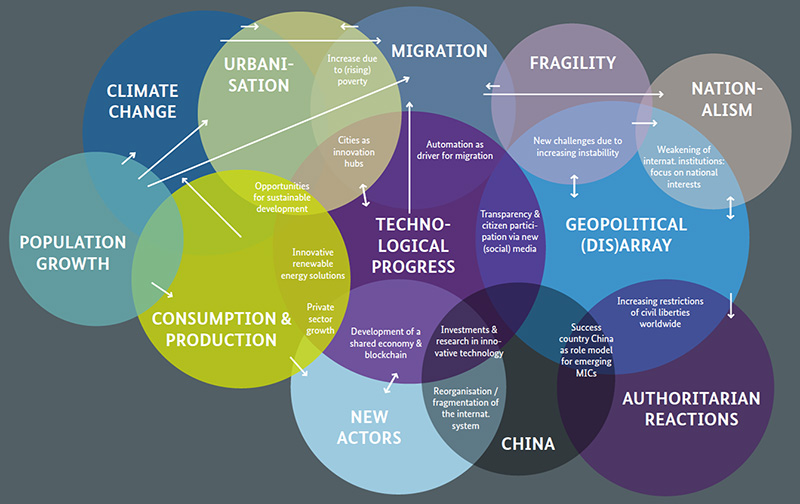Global trends
“Change can be measured, the reasons for it cannot”

The media frequently report on the misery in the world, on famines and disasters. Reports on development successes tend to be few and far between. What is your view? Has the world become a better or worse place since the turn of the millennium?
That depends on the standpoint of the observer. The trend of developing countries getting more room for manoeuvre has certainly become stronger. But from the industrialised countries’ viewpoint, that could be perceived as a change for the worse. Ultimately, it means power is shifting away from them. The impact of this trend is compounded by the disintegration of the west that we are currently experiencing. Consensus with the US has broken down, and it has even become shaky within the EU. If one looks at the figures for individual factors – those published by the World Bank for instance – one certainly sees successes. Extreme poverty has decreased. But that does not mean the problem has been resolved: there are still lots of people living on very low incomes. My impression is that people in developing countries tend to be optimistic; they see new opportunities. Most do not share the view, which is widespread in the west, of things getting worse on numerous fronts. We must bear in mind, however, that the “global south” is very heterogeneous. Some countries have seen improvements, others are worse off. Take Brazil, for example. Poverty and the extreme income inequality that were prevalent at the turn of the millennium have decreased; now the trend is moving in the other direction. And wherever there is war, life has become worse. Sub-Saharan Africa, moreover, is facing the prospect of sharp population growth, which will present massive challenges. At the same time, countries like China and India are now testing their own approaches to development cooperation there. The cards are being reshuffled.
So what do you consider the most important development successes of recent years?
The reduction of extreme poverty surely tops the list, but it must be considered in conjunction with social inequality. Some countries have succeeded in reducing both. Brazil, Cambodia, Mali, Peru and Tanzania are examples. In many countries, the interest in social-protection systems is growing, and that in itself is serious progress. Innovative cash-transfer systems are now operational in Mexico, India and Bolivia. The Sustainable Development Goals (SDGs) demand broad access to health insurance. The relevance of pension systems is getting ever more attention. Developments of this kind, of course, reflect activism of social and political movements too. Another big step forward is that developing countries are able and willing to assume more responsibility – for improving life domestically as well as contributing to solving global problems. This is evident in the Paris Climate Agreement and in the 2030 Agenda. All countries have committed to take action. Developing countries are now seen as part of the solution, and they also regard themselves as such. The idea that the north sets targets and supports developing countries to achieve them is outdated, and the developing world’s increasing strength reflects this truth.
To what extent are development achievements based on development assistance?
Poverty reduction is closely linked with economic growth, but it also requires redistribution through higher wages, fair taxation and the establishment of social protection systems. Other factors matter too, for example, expanding formal sector employment, which means more secure jobs. This issue has helped to reduce poverty in Brazil. The commodity boom has driven economic growth, but it has not helped to bring about a broad-based reduction in poverty, especially in Africa. Development cooperation itself does not result in economic growth, but it is often instrumental in strengthening social protection. Lots of innovative programmes, such as the cash-transfer models I mentioned, have been co-financed and supported by donor agencies. Donor evaluations now show where improvements are needed to achieve sustained positive impacts. Development cooperation also plays an important role in promoting the development of renewable energies and other climate measures. Developing countries need a great deal of technological support and financing in that area. The same applies to environmental programmes. Donors’ facilitation has often been crucial for investments in environmental protection – just consider tropical forests in Latin America and Africa.
How does one measure the success of development assistance?
What we can measure are the areas supported by international donors and how funding changes over time. This has enabled us to show, for example, that the Millennium Development Goals (MDGs) contributed to focusing such funding on specific issues. It is harder, however, to establish how much it contributes to improvements in indicators such as school-attendance rates or access to safe drinking water. Such things need to be assessed in country-specific analyses and evaluations. The sharp fall in global poverty is largely due to development successes in China, which the country achieved on its own. The SDGs present a more complex challenge than the MDGs, by the way. The reason is that they cover so many areas of activity. It would be interesting to draw up a comparison, showing which of them receives donor support, and how much of it, and see whether improvements are achieved faster in the areas on which donor assistance is focused. Change can be measured, but causal relationships are very hard to establish. The needed reliable data is often unavailable. It would help if donors themselves did more to assess their impacts. That would require systematic evaluation, not just at the project level but at system level, over longer periods of time.
If change is measureable, as you say, are changes for the better communicated well enough?
No, I think they are not communicated well enough. But the blame cannot be laid at the door of the BMZ. The main problem is the lack of media interest. I would like to see journalists go to certain countries with a more open mind, without preconceived ideas, and find out which problems matter to the countries’ people. At the same time, I would welcome better coverage of international processes, including in the daily press. And I would like to see democratic political parties show more interest in developing countries. To create a basis for informed decisions, German policymakers could rely more on the political foundations, which are close to the parties in the Bundestag and have a strong presence in developing countries (see D+C/E+Z e-Paper 2017/12, p. 35). I have often been told by foundation staff that it is extremely difficult to generate interest in development policy within their parties. I find that quite worrying. It is important to ensure that the political basis for development policy does not disintegrate. Our society has a keen interest in sustainable development, not just in Germany and Europe but also in the global south. The importance of cooperating with developing countries needs to be communicated, in particular, to new members of parliament. It is not just about development issues; it has implications for security, foreign affairs, economic prospects and many other fields of policymaking. It is important to see developing countries as partners and not just as objects of development policy.
What are the main factors that will determine development successes in the near future?
The Delphi study highlights them quite well (see box). I think all of the trends identified in it will be important. Population growth is particularly an issue in Africa, for example, whereas Asia already has a number of countries where the ageing of society is the big demographic challenge. Digitalisation is an important trend that will have massive impacts on developing countries’ comparative advantages. The automation of manufacturing, for instance, will reduce the advantage of low wages and impede integration in global markets. On the other hand, opportunities may arise on national and regional markets. Climate change will also be a major factor, as is already evident. The impacts will be felt more severely in developing countries than here because they do not have the same financial and knowledge resources to prepare for them. The more reluctant the industrialised world is to take preventive action, the greater will be the impacts on developing countries, especially in Africa or small island states. What I find interesting about the trends flagged up by the Delphi study is that they are just as relevant for Germany as for developing countries. The ability to respond and protect may differ – but every country will be affected. And that presents an opportunity for cooperation.
How do studies of this kind help to make development efforts more effective?
For this study, experts were asked whether they agreed with a list of identified trends and whether development policy could make a positive difference. As far as the relevance of the trends was concerned, the level of agreement among the experts was very high; opinions differed widely, however, on the relevance of development assistance in various areas. Policymakers can now respond to the results. They need to decide whether to act where the trends’ impact is greatest or where the most help is needed, and whether to experiment with innovative approaches in new areas – and arrange for the experiments to be simultaneously studied and evaluated. The Delphi study can be quite useful if it contributes to informing strategic debate within the BMZ. The point was to start that debate. The paper does not contain specific recommendations for action.
Imme Scholz is deputy director of the German Development Institute/Deutsches Institut für Entwicklungspolitik (DIE).
imme.scholz@die-gdi.de










